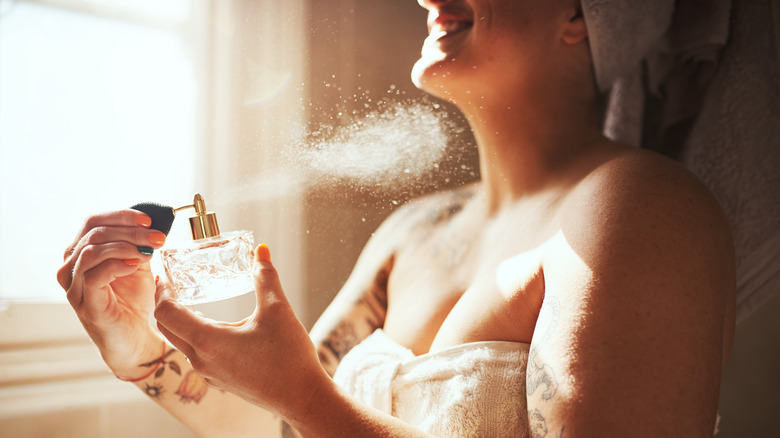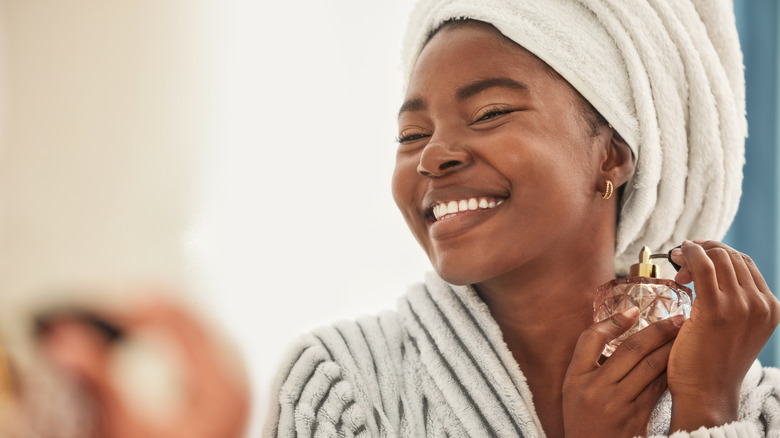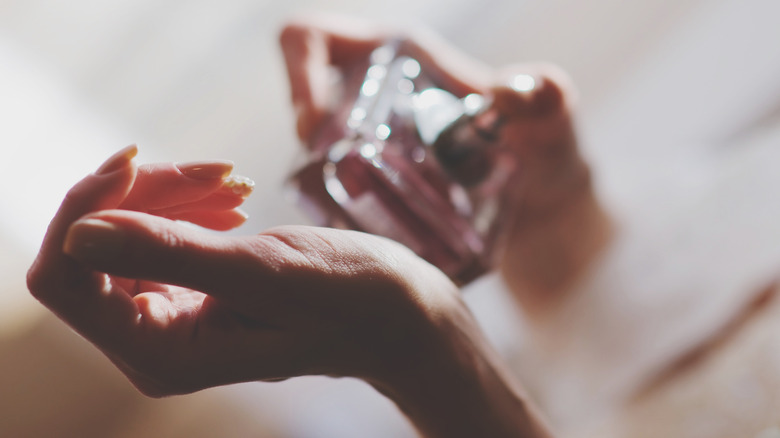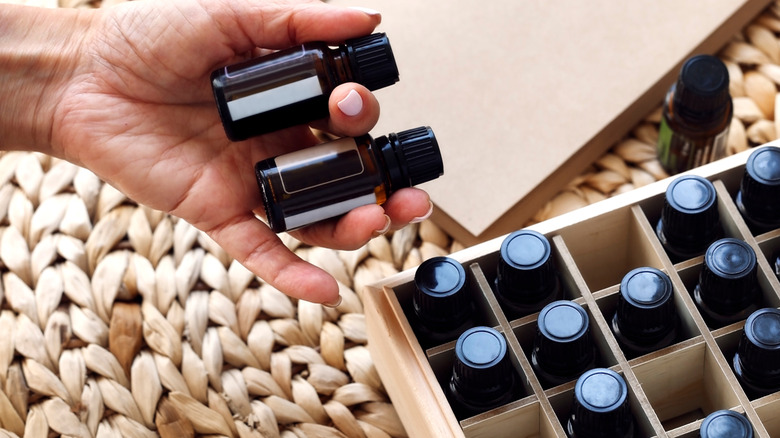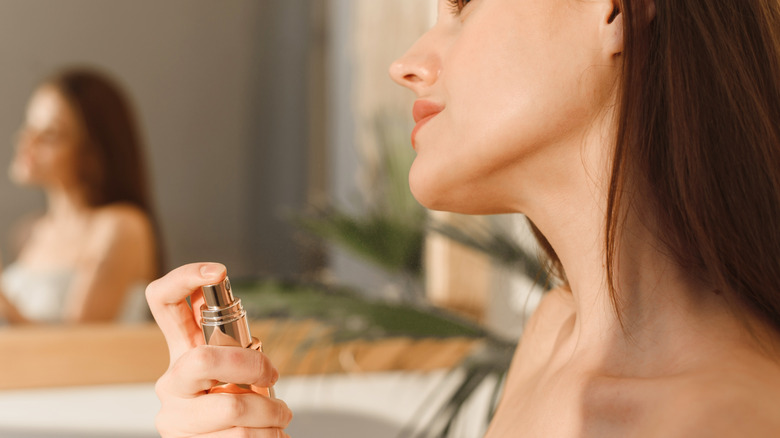5 Perfume Mistakes You're Probably Making
Unless you're well-versed in the art of applying perfume correctly, you're likely making some mistakes. But don't fret — we're here to fix that. There are a few things worth knowing if you want to get the most out of your signature fragrance, and taking the time to learn is helpful. After all, perfume is expensive and you want to make sure you're getting the absolute most out of your product. On top of that, you've likely spent a good deal of time finding that special scent that captures your personality and sensual aura, so it's essential to master how to bring out the most in your fragrance.
To learn all we needed to know, Women spoke with scent expert Onyi Ifeguni, who has over twenty years of experience in the fragrance industry. She has a BSc in Pure and Industrial Chemistry and Biochemistry, as well as an MS in Forensic Chemistry. Ifeguni is also the founder of the clean beauty brand Tabbeau, so there is undoubtedly a lot to learn from this titan.
Don't rub your fragrance into your skin
One of the best things you can do to make sure the scent of your expensive perfume sticks around is to spray your fragrance and let it air dry on your skin. Fragrance expert Onyi Ifeguni tells Women to do this instead of the age-old practice of rubbing your wrists together after you spritz them. "Rubbing perfume on the skin, particularly at the wrists, breaks down the fragrance's molecular structure," Ifeguni explained. "This not only speeds up evaporation but also changes how the natural top and middle notes will unfold."
Instead of rubbing fragrance into your skin, lightly spray the product and give it time to dry on your skin without any added interference. Ifeguni explains that this gives the natural ingredients in your aroma a chance to settle and engage with your skin's chemistry. It also allows the complexity of layered scents to come forward.
Don't apply too much perfume at once
We all want our perfume to pop, but spritzing too much at once is another mistake to avoid. Onyi Ifeguni explains to Women why it's a common mistake to douse ourselves in too much fragrance. "Over-applying, especially with natural perfumes, can be overwhelming to both the wearer and those around them," Ifeguni notes. "Natural ingredients can sometimes carry a stronger impact due to their complexity and purity, and they often change and deepen over time."
Instead, Ifeguni advised starting with a smaller amount of a scent, especially if you're just getting introduced to the fragrance. Natural perfumes need some time to develop, and a small spritz gives them time to unfold on the skin. If you want a little more impact, Ifeguni suggests reapplying your scent a few hours later. Be mindful of how this new addition of scent enhances the notes and overall effect as you get to know the fragrance.
Don't store your perfume in the wrong environment
It's important to consider perfume storage to make sure it lasts. After all, many people like to use different fragrances during different seasons; for example, bright and fresh perfume trends dominate the summer months while winter fragrance trends are all about musky, spicy tones. If you're not reaching for a certain perfume for several months out of the year, it's important to make sure you're storing it correctly. Or maybe you have one tried and true favorite scent, like Princess Catherine of Wales, who sticks to the same, beloved perfume year in and year out, and you want to preserve the bottle's integrity. Whatever the case, fragrance storage is crucial.
Onyi Ifeguni tells Women, "Heat, light, and humidity can break down natural ingredients quickly, which will cause the scent profile to alter or degrade ... Natural-derived ingredients, especially, can lose their potency and complexity if exposed to these elements." To preserve the complexity of perfumes, Ifeguni recommends storing them in cool, dry places and avoiding direct sunlight at all costs. A drawer or box is a good place to maintain the integrity of the scent.
Choose your perfume with an awareness of its evolving scent
One lesser-known mistake when it comes to perfumes is choosing one based only on its initial scent. When you're at the perfume counter, a fragrance can tell quite a striking story; however, the beauty and complexity of fragrances is that they change over time. Fragrance expert Onyi Ifeguni shares with Women that it's important to engage with a scent over a certain timespan before settling down with it. "The initial top notes are just the beginning; natural perfumes are often designed to evolve," Ifeguni says. "The heart and base notes can differ significantly from the initial impression, revealing deeper, more complex characteristics over time."
To avoid this mistake, Ifeguni said that it was best to engage with a scent for at least 20-30 minutes before deciding. This allows the middle and base notes to come alive on your skin and harmonize. These middle and base notes are the most important since they linger the longest, and you want to know the whole picture of what you're buying.
Don't ignore your skin's chemistry and pH
It's important to consider your skin's chemistry and pH levels when choosing a fragrance. The pH levels of your skin determine how acidic or alkaline your skin is, and this significantly impacts how a fragrance lives on your skin once it interacts with your natural oils. The normal pH range for skin is 4.5 to 5.5. You can have your skin's pH tested by a dermatologist, but one easy way of gauging it is that dryer skin tends to be more alkaline, thus having a pH above 5.5, whereas oily skin has a lower pH range, around 4. More alkaline skin with a higher pH can sustain subtle scents longer. Whereas acidic skin with a lower pH needs a stronger scent.
According to Onyi Ifeguni, what's important is that you consider your skin's pH levels and chemistry, as they significantly alter how a perfume smells on you. If it doesn't work well, it won't develop in its rich layers and notes. Ifeguni offers a solution to this scent mistake. "Test perfumes on your skin rather than on paper strips or in the air," she urged. "Allow it to sit for a bit and notice how it interacts with your unique chemistry — natural ingredients especially can bring out a distinct scent on each wearer, creating a signature unique to you. " By actually testing it on your skin, you'll get a truer sense of how the fragrance is working with your body.
